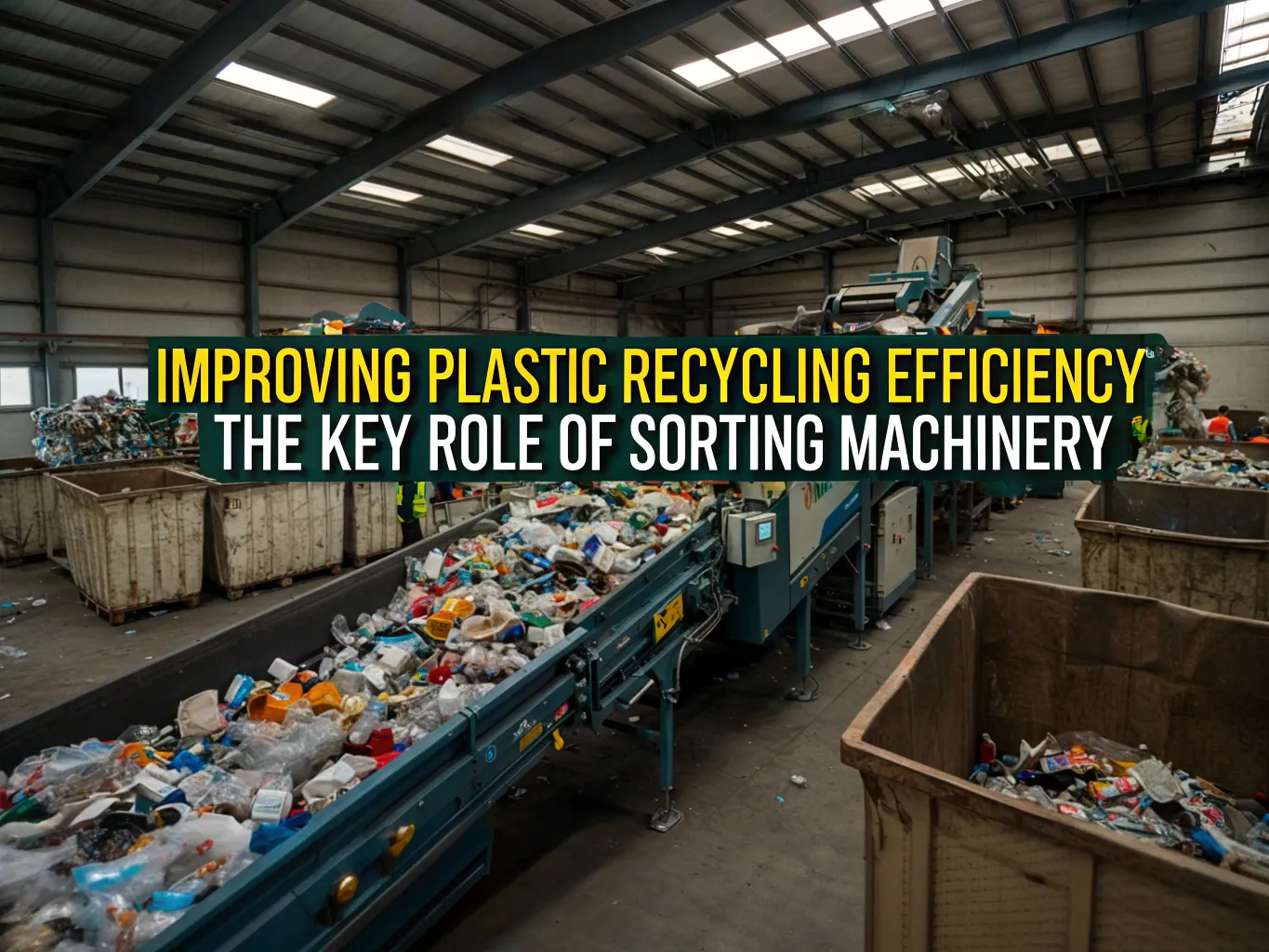A műanyag-újrahasznosításban használt válogatógépek megértése
A műanyag-újrahasznosító iparban a válogatógépek kulcsszerepet játszanak a különböző típusú műanyagok osztályozásában olyan tulajdonságok alapján, mint a szín, a sűrűség és az összetétel. Ezek a gépek fejlett technológiák és eljárások révén leegyszerűsítik a válogatás folyamatát, biztosítva az optimális anyag-visszanyerési hatékonyságot.
Alkalmazások a műanyag újrahasznosításban
Válogatógépek széleskörű alkalmazási lehetőségekkel rendelkezik a műanyag-újrahasznosító iparban, beleértve:
- Különböző típusú műanyagok, például PET, HDPE, PVC és PP szétválogatása újrahasznosítás céljából.
- Szennyező anyagok és szennyeződések eltávolítása a műanyag hulladékáramokból, például címkékből, kupakokból és egyéb nem műanyag anyagokból.
- Műanyagok szétválogatása szín és átlátszóság alapján, hogy megfeleljenek az újrahasznosítási követelményeknek.
- Válogatott műanyagok előkészítése további feldolgozásra, például zúzásra, mosásra és pelletizálásra.
Válogatógépek típusai
- Optikai szortírozó Az optikai válogatók optikai érzékelőket és kamerákat használnak a műanyagok azonosítására és válogatására szín, forma és egyéb vizuális jellemzők alapján.
- Örvényáramú elválasztó Az örvényáramú szeparátorok mágneses mezőket használnak a színesfémek, például az alumínium és a réz elválasztására a műanyag hulladékáramoktól.
- Sűrűségelválasztó A sűrűségszeparátorok a műanyagok sűrűségbeli különbségeit használják ki a könnyebb műanyagok elválasztására a nehezebb anyagoktól.
- Levegőosztályozó A levegős osztályozók légáramlást használnak a műanyagok aerodinamikai tulajdonságaik, például méretük és alakjuk alapján történő szétválasztására, hatékonyan eltávolítva a könnyű szennyeződéseket.
A válogatási technológiák mélyreható ismerete
- Optikai szortírozó Az optikai válogatók fejlett gépek, amelyek optikai érzékelőkkel és nagy felbontású kamerákkal vannak felszerelve, és valós időben képesek rögzíteni és elemezni a műanyaghulladék-áramok színét, alakját, méretét és egyéb vizuális jellemzőit. Az előre beállított szabványoknak köszönhetően az optikai rendszer képes azonosítani a különböző típusú műanyagokat, és pontosan válogatni azokat. Ez a technológia hatékonyan választja szét a különféle műanyagokat, például a PET-et, a HDPE-t és a PVC-t, és a modern újrahasznosító létesítmények nélkülözhetetlen részét képezi.
- Örvényáramú elválasztó Az örvényáramú szeparátorok erős mágneses mezőket használnak a színesfémek, például az alumínium, a réz és a sárgaréz elválasztására a műanyag hulladékáramokból. A forgó mágneses mezők örvényáramokat indukálnak a fémekben, aminek következtében azok taszulnak és elkülönülnek az anyagáramtól, miközben a műanyagok továbbra is áthaladnak rajta. Ez a válogatási módszer kritikus fontosságú az értékes fémek kinyeréséhez a vegyes hulladékáramokból, és elősegíti az erőforrások újrahasznosítását és újrafelhasználását.
- Sűrűségelválasztó A sűrűségszeparátorok a műanyagok sűrűségbeli különbségeit használják ki a hatékony szétválasztásukhoz levegő vagy folyadék flotációs mechanizmusok segítségével. A könnyebb műanyagok, például a PET-palackok és -fóliák, hajlamosak a víz felszínén úszni, míg a nehezebb anyagok, mint például a PVC vagy az ABS, a víz aljára süllyednek. Az áramlási sebesség és a felhajtóerő beállításával a sűrűségszeparátorok pontosan képesek szétválasztani a műanyagokat, növelve a visszanyerés hatékonyságát.
- Levegőosztályozó A levegős osztályozók szabályozott légáramlás segítségével választják szét a műanyagokat aerodinamikai tulajdonságaik alapján. A gép szabályozott légáramot generál, amely a műanyag részecskéket több kamrán vagy csatornán keresztül fújja. A folyamat során a könnyű részecskéket (például fóliákat vagy habot) a légáram felemeli és külön gyűjtőtartályokba irányítja, míg a nehezebb anyagok (például merev műanyagok vagy szennyeződések) az aljára hullanak. A levegős osztályozók különösen hatékonyak a könnyű szennyeződések eltávolításában a műanyaghulladék-áramokból, biztosítva a visszanyert anyagok tisztaságát és minőségét.
Ez a négyféle válogatógép létfontosságú szerepet játszik a modern újrahasznosító létesítményekben, hatékonyan elválasztja és visszanyeri a műanyagokat és más értékes anyagokat a vegyes hulladékáramokból.
A válogatógépek előnyei a műanyag újrahasznosításban
- Fokozott hatékonyságA válogatógépek automatizálják a válogatás folyamatát, ezáltal növelve az újrahasznosítási műveletek teljesítményét és hatékonyságát.
- Javított anyagminőségA szennyező anyagok eltávolításával és a műanyagok tulajdonságaik szerinti válogatásával a válogatógépek biztosítják a kiváló minőségű újrahasznosított anyagok előállítását.
- Erőforrás-helyreállításA válogatógépek segítenek értékes műanyagok kinyerésében a hulladékáramokból, hozzájárulva az erőforrások megőrzéséhez és a környezeti fenntarthatósághoz.
- KöltségmegtakarításA hatékony válogatás csökkenti a munkaerőköltségeket és az anyagpazarlást, ezáltal mérsékelve a műanyag-újrahasznosítási műveletek összköltségét.
Növelje műanyag-újrahasznosítási hatékonyságát európai gépekkel
Készen áll arra, hogy növelje műanyag-újrahasznosítási kapacitását? Kapcsolat Rumtoo gépek Ismerje meg széles választékú, kiváló minőségű válogatógépeinket még ma! Szakértő csapatunk segít megtalálni az ideális megoldást műanyag-újrahasznosítási igényeinek kielégítésére és a működési hatékonyság javítására.



